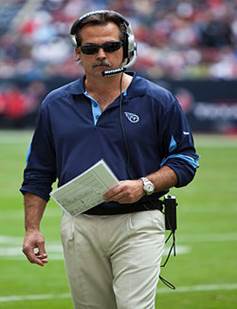In the world of American football, few figures have evoked as much discussion, admiration, critique, and longevity as Jeff Fisher. While his coaching record has often polarized fans and analysts alike, there’s no disputing one thing: he has carved out a financially successful career that reflects consistency, endurance, and a mastery of professional relationships. As of 2025, Jeff Fisher’s net worth is estimated at $25 million — a testament not just to wins and losses, but to a long career made of strategic decisions both on and off the field.
From his early years as a tenacious defensive back to a decades-spanning coaching journey that saw him become one of the longest-tenured head coaches in modern NFL history, Fisher has transformed himself from a promising young player into a financially secure figure in American sports. But this story isn’t just about coaching stats — it’s about how Jeff Fisher quietly built a substantial financial foundation, avoided the noise, and came out the other side with a multimillion-dollar legacy.
Humble Roots and the Foundation of Discipline
Jeffrey Michael Fisher was born on February 25, 1958, in Culver City, California — a region deeply embedded in football culture. He was raised in the Los Angeles area, attending Taft High School in Woodland Hills, where his athletic abilities quickly set him apart. While he also played baseball, football became his calling. After high school, he enrolled at USC, one of the premier college football programs in the nation. There, he played under legendary coach John Robinson and became a defensive leader for the Trojans.
Fisher’s success at USC led to his selection by the Chicago Bears in the seventh round of the 1981 NFL Draft. While he never achieved household name status as a player, he earned a reputation as a tough, cerebral, and disciplined athlete. A serious leg injury ended his playing career after just five seasons, but Fisher didn’t walk away from the game. Instead, he pivoted — and in doing so, began to build the foundation of his long-term wealth.

The Shift to Coaching: A Different Kind of Playbook
Shortly after retiring, Fisher entered the coaching world, first as a defensive assistant and then as a rising talent within the NFL coaching ranks. His coaching career officially began with the Philadelphia Eagles in 1986 under Buddy Ryan. Fisher was a quick learner and proved particularly adept at scheming defensive plays — a skill that became central to his identity throughout his career.
By 1994, Fisher had taken over as the head coach of the Houston Oilers — a team that would eventually become the Tennessee Titans. He was just 36 years old at the time, making him one of the youngest head coaches in the league. The promotion wasn’t just professionally significant — it was financially transformative. Head coaching salaries in the NFL during the 1990s were relatively modest compared to today, but even then, Fisher was likely earning close to $1 million per season in his early years as a head coach. Over time, with tenure and success, those numbers steadily rose.
The financial foundation built during his Titans era would be critical to the $25 million net worth he holds today. Fisher was the head coach of the franchise for 17 seasons, making him one of the longest-serving head coaches in modern NFL history. That kind of longevity is rare in a profession known for quick exits and revolving doors. It also came with steady salary growth, contract renewals, bonuses, and retention incentives.
The 1999 Super Bowl Run: Legacy and Leverage
Perhaps the most pivotal moment in Fisher’s career — from both a professional and financial standpoint — was the 1999 season, when he led the Titans to Super Bowl XXXIV. Though the team lost in dramatic fashion to the St. Louis Rams (just one yard short of victory), Fisher’s reputation skyrocketed.
From that point forward, Fisher’s market value as a coach significantly increased. He became known as someone who could manage egos, build competitive teams, and handle the pressure of playoff football. It’s estimated that during his peak years with the Titans in the early 2000s, Fisher was earning between $3 million to $5 million annually, with various performance-based incentives likely increasing his total take-home.
While his teams were not always championship-caliber, Fisher became something of a stabilizing figure — a coach owners could rely on to keep a franchise competitive. In the NFL, where chaos often dictates coaching tenure, Fisher’s durability was itself a form of currency. And that currency translated directly into years of consistent income.
Coaching the Rams: The Final NFL Chapter
After parting ways with the Titans in 2010, Fisher took a brief hiatus before returning to coach the St. Louis Rams (later relocating to Los Angeles) in 2012. This move was notable not only because it marked his return to professional football but also because it came with a substantial financial agreement. His contract with the Rams was reportedly worth $35 million over five years, which placed him in the upper echelon of NFL coaching salaries at the time.
While his tenure with the Rams did not yield a playoff appearance and ended in 2016, the contract itself padded his net worth significantly. Even after being fired before the contract expired, Fisher was believed to have received a buyout for the remaining years, ensuring that his income stream continued well after his final NFL game.
That deal, combined with nearly two decades of head coaching contracts, appearance bonuses, endorsements, and speaking engagements, played a massive role in Fisher’s net worth approaching the $25 million mark.

Life After the Sidelines: Earnings Beyond Coaching
Even though Fisher has not returned to full-time coaching since his departure from the Rams, he has not vanished from the sport entirely. He has appeared as an NFL analyst on networks like Fox and ESPN, although not as a regular host. These appearances — often tied to his experience in defensive strategy and team building — have contributed to his post-coaching income.
Additionally, Fisher has remained active behind the scenes in football. He was briefly connected to roles in the Alliance of American Football (AAF) and other upstart leagues, though those projects ultimately fell short of long-term viability. Nonetheless, his involvement suggested that he remained valuable as a football mind and leadership figure.
Fisher also benefits from NFL pension plans, which are among the most generous in American sports. His decades of service as both a player and coach mean that his retirement income from the league is considerable. Estimates suggest that former coaches with his level of tenure may receive six-figure annual pensions, particularly when combined with deferred income and retirement bonuses negotiated during their contracts.
Real Estate and Personal Investments
While Fisher has not been the subject of flashy real estate headlines or celebrity home tours, he has made several strategic property purchases throughout his career. He owns a home in Nashville, where he spent the bulk of his coaching career with the Titans, and another in Montana, where he retreats for privacy and outdoor activities.
Fisher is known for being financially cautious. He has never been associated with extravagant spending, failed ventures, or tabloid-level controversies. Instead, he has managed his income steadily, with a focus on sustainability rather than flash. His real estate choices, lifestyle expenses, and privacy suggest someone who values long-term financial health over instant gratification.
It is likely that Fisher has invested portions of his earnings in diversified financial vehicles — including retirement accounts, conservative mutual funds, and advisory-managed portfolios. Though he has not publicly revealed details of his investments, his consistent net worth over the years — despite no recent major coaching salaries — supports the idea of smart asset management.
Family, Privacy, and a Life Beyond the NFL
Jeff Fisher has always maintained a degree of separation between his public football life and his personal affairs. He has three children, including Brandon Fisher, who followed in his footsteps and became a football coach. Though their professional paths have occasionally overlapped, Fisher has ensured that his legacy is not solely defined by football statistics but by personal values and family involvement.
He continues to stay involved in community work, particularly in Tennessee, where he remains a respected figure. Whether through charity events, alumni appearances, or youth coaching mentorship, Fisher’s influence in the football community has endured.
These involvements, while not massive revenue generators, do allow Fisher to remain connected to the sport and its ecosystem — and likely create opportunities for consulting, event participation, or brand ambassadorships that contribute modestly to his income stream.
Looking Ahead: What’s Next for Jeff Fisher?
Now in his late 60s, Jeff Fisher shows no sign of aggressively pursuing another full-time NFL role. While there are always rumors about veteran coaches returning, Fisher has mostly distanced himself from the high-pressure chaos of sideline life. Instead, he appears to be enjoying a more balanced lifestyle — one that allows for some media presence, low-key football consultation, and family time, all while living off the wealth he’s carefully earned and managed.
Given current trends in football media and analysis, there’s a strong possibility that Fisher could increase his income through podcasts, coaching summits, or even a book chronicling his decades in the NFL. His personality — calm, candid, and pragmatic — makes him an ideal candidate for long-form content, should he ever choose to re-enter the spotlight in that way.
Until then, his $25 million net worth stands as a reflection of a career that may not have won every Super Bowl but certainly won in the game of financial longevity and professional survival.

